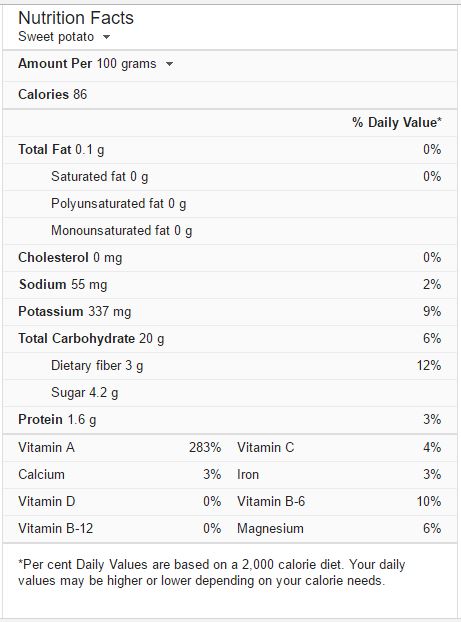 |
| Photo by: Minimalistbaker.com |
Potato vs Sweet Potato?
 |
| Captured from: http://www.precisionnutrition.com/regular-vs-sweet-potatoes |
According to the 2010 census, the average American ate a mere 5.2 pounds of the brightly colored vegetable per year. That’s less than 5% of the average amount of white potatoes each person in the U.S. consumes each year, which totals about 117 pounds.
Moreover, other factors, like the preparation method, strongly influence how foods affect weight gain, said Adelia Bovell-Benjamin, a nutritionist and sweet potato expert at Tuskegee University in Alabama. People tend to eat sweet potatoes baked or boiled, not fried, but more than a third of all white potatoes are consumed as either chips or French fries, experts said.
Frying potatoes in oil also increases the caloric density, meaning that there are more calories per bite, plus the salt content tends to be high, said Bonnie Liebman, a nutrionist at the Center for Science in the Public Interest. Eating foods that are high in salt is associated with increased risk for high blood pressure, cardiovascular disease and stroke. Neither of these things is a problem with sweet potatoes, she added.
Preparation methods being equal, however, the brightly colored roots could still have a leg up. Sweet potatoes are loaded with antioxidants, said Bovell-Benjamin. They are rich in beta-carotene, vitamin C, pro-vitamin E, anthocyanins and sporamins. Studies suggest that eating antioxidant-rich foods could lower the risk of developing certain chronic conditions, like heart disease and cancer. Anthocyanins have been shown to decrease weight gain from high-fat diets in pre-clinical studies in animals, and sporamins may have anti-carcinogenic properties.
Sweet potatoes also have a lower glycemic index than regular potatoes. The glycemic index is a measure of how quickly blood glucose levels rise after eating. Foods that have a low glycemic index do not cause a quick spike in blood sugar and thus do not overwork the pancreas, said Bovell-Benjamin. As a result, people don’t experience the same roller coaster of sugar highs and lows, which can lead to hunger and the consumption of extra calories. In other words, foods with lower glycemic indexes, like sweet potatoes and brown rice, make you feel full longer.
People rarely eat meals composed of only one food type, so it’s important to take everything in context. A sweet potato isn't really good for you if it’s fried and eaten along with a generous serving of mom’s apple pie.








0 Comments